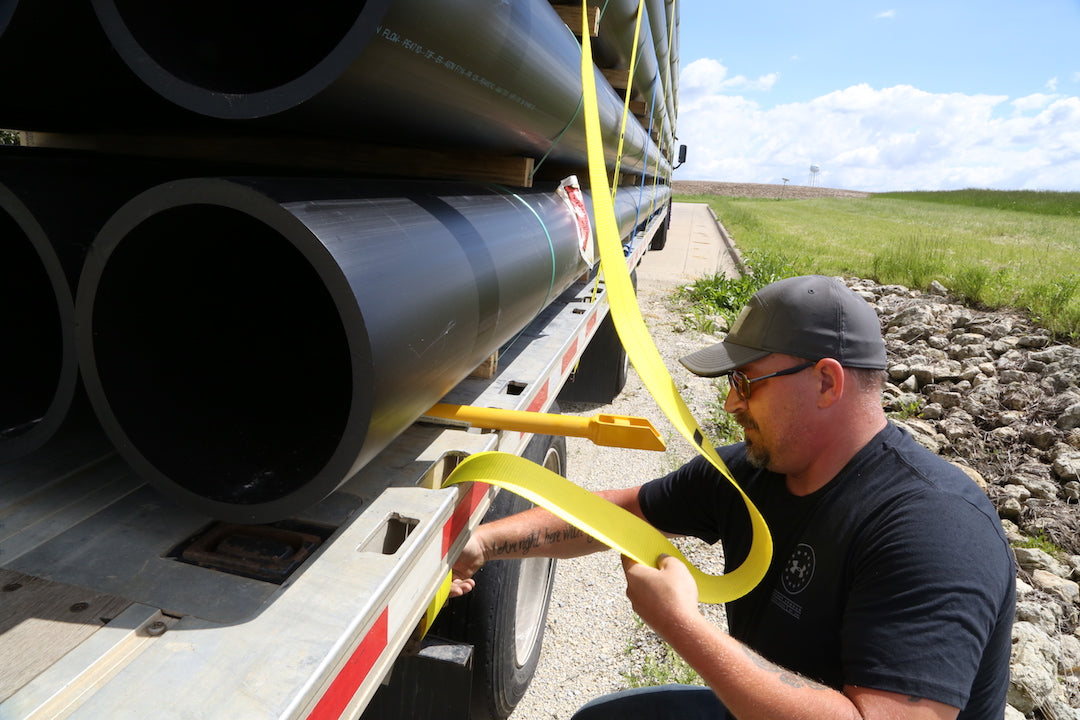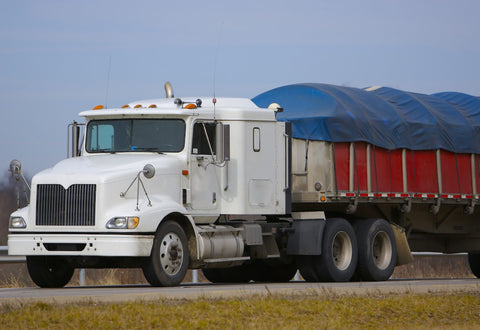
9 Types of Trailers in the Trucking Industry, and Which Fits Your Freight Needs

Truckers collectively travel 450 billion miles each year to haul cargo for consumers, carrying 11 billion tons of merchandise, electronics, supplies, and produce. This means truckers are the most commonly used means of transporting freight in today's world. But, with many different trailers on the road today, it can be difficult to identify which trailer type is used for, and what’s best for your freight.
We’ll break down some of the most common trailers found in America, and how to use them for hauling cargo. Read to find out the 9 types of the most common trailers, and which type best fits your freight needs.
Dry Van and Enclosed Trailers

As it indicates in the name, an enclosed trailer has a container to enclose the load. When it comes to the shipments of pallet-based, boxed, or loose commodities, dry van trailers are the go-to solution. Typically around 53 feet, the dry van trailer is the most common type of trailer on the road today.
Truckers usually use dry van trailers to ship the items that people ship every day. Large corporations like Walmart and Target use dry van trailers to transport their inventories like clothing, non-perishable food items, and household goods. These trailers are the ideal equipment for any shipper/receiver to use anytime because of their box-like shape and ability to back right into the loading dock’s bay. They are also a versatile and cost-effective investment for any company looking to expand its fleet and secure their cargo.
The only disadvantage is the trailer’s floor cannot support a lot of weight. They’re not good for carrying oversized loads (unlike a flatbed).
Read 3 Accessories Every Enclosed Trailer Hauler Should Have to see what enclosed trailer equipment you need to protect your cargo.
Standard Flatbed Trailers

The standard flatbed trailer is another popular type of trailer that you’ll see on the road as well. They come in different sizes like 24, 40, 45, 48, and 53 feet. The 48-foot flatbed trailer is the most frequently used.
The standard flatbed trailer is a very versatile trailer in today’s world. The flatbed’s open back and sides allow for easy loading and unloading. You can haul steel, construction equipment, lumber, and other open-air commodities with this trailer type.
It doesn’t have a container to contain the cargo like a dry van trailer. Therefore, you must use heavy-duty equipment to secure your cargo, like our tarps to cover the items. At US Cargo Control, we have transport chains and binders, tiedown straps, and tarp solutions to ensure cargo safety.
Read the 5 Pieces of Flatbed Trailer Equipment Every Driver Should Have.
Refrigerated Trailers (or Reefers)

As it says in the name, refrigerated trailers move any contents that require temperature control (think, cool temperatures). Their temperature control abilities and insulated walls make them the only type of trailer that’s perfect for hauling perishable items like fruit, frozen food, pharmaceuticals, and ice cream.
The refrigerated trailer only hauls items up to 8 feet tall and 8 feet wide, so reefers cannot haul any commodity that exceeds the length of the deck.
Drop-Deck/Step-Deck Trailers

Drop deck (or step-deck) trailers are an alternative to the flatbed trailer when loads cannot transport on the flatbed trailer due to the freight's height. The flatbed trailer is about 60 inches above the ground, while step deck trailers are close to the ground to provide a little leverage for carrying loads taller than 8 feet.
This drop-deck trailer has two deck levels, the upper-deck and the lower-deck, and has a ramp for unloading. The most critical factor about this trailer is they are safer for unloading by a forklift because they’re closer to the ground.
Double Drop/Lowboy Trailers

Also known as a low-bed or float trailer, the double drop trailer is closer to the ground than other types. The trailer has two “drops” that reside behind the gooseneck and before the back wheels.
These trailers sit very close to the ground, which the drop allows the shipping of huge items like construction equipment that’s heavier than the maximum weight limit of other trailer types. Their maximum height in width is greater than other trailer types. The weight limit is also 40,000 pounds (and can be up 80,000 pounds). These factors are perfect for hauling machinery and equipment like bulldozers and excavators.
These trucking trailers are the workhorses, but you would need additional permits from authorities.
Removable Gooseneck Trailers (RGN)

These are excellent for carrying tall and long freights, and can come in a variety of sizes. The gooseneck secures the trailer to the tractor, and the front of these trailers can be removed.
How it works is that the gooseneck is a detachable front, allowing the trailer to drop on the ground in order to create a ramp. The gooseneck is a perfect tool for hauling large machinery from point A to B. They can require additional permits due to the height and weight load and can have up to 20 axles attached to the trailer. The more axles, the more the RGN can carry.
They are more specialized, so they render a more expensive usage.
Extendable Flatbed Stretch Trailers

As it hints in the name, this flatbed extends when you haul excessively long freight unable to ship by a standard type of trailer. The extendable flatbed trailer can extend to 80 feet, allowing shipments of larger loads to ship.
When the trailer bed needs to extend, you release the pin that's joining the two sections, which send the extendable portion of the bed to "stretch."
Side-Kit Trailers

Side-kit trailers transport materials that do not need to be packed in containers or materials that cannot be packed. For example, granular materials like crops, coal, powders, gravel, etc. The side-kit trailer has a panel made from either plywood or fiberglass and typically has a tent-like top covering.
Granular materials are irregular in shape that they can’t be contained in an enclosed container, but we carry many types of tarps you can use to cover these types of materials.
They’re highly versatile trailers and they have low operating costs, making side-kit trailers a highly used trailer in the industry.
Specialized Trailers

A specialty trailer refers to a container that carries a particular product. You can transport certain items like hazardous materials or liquids, but the amount of weight they can move varies.
These trailers require a special permit and the driver has to have a special license to tow the load. Below are some types of specialized trailers:
- Trailers for transporting hazardous materials like petrol, oil, diesel, and other hazardous/flammable materials. This requires additional permits and higher costs to transport them.
- Medical Trailers that include mobile clinics to provide medical services and equipment to people on-site. This requires additional permits.
- Food Service Trailers that accommodate entire kitchens, providing food services to people on-the-go.
Find the Right Cargo Equipment for Your Trailer Type
Whether you need cargo control equipment for an enclosed trailer or flatbed trailer, US Cargo Control has a wide variety of trailer securement solutions. Our heavy-duty trucking equipment is designed with safety and industry standards in mind and made to withstand any abuse that the road may bring its way.
No matter which trailer type you choose, you can be rest assured knowing that you’re buying from a leading cargo securement supplier that’s trusted by thousands in the trucking and transportation industry. Our Midwestern team of experts keeps you moving forward by helping you get what you want, when you need it.
To ensure the safety of your cargo, the people driving around you, and yourself, it's important to haul cargo on your trailer correctly. Read the Dos and Don'ts of Load Securement Trailers.





